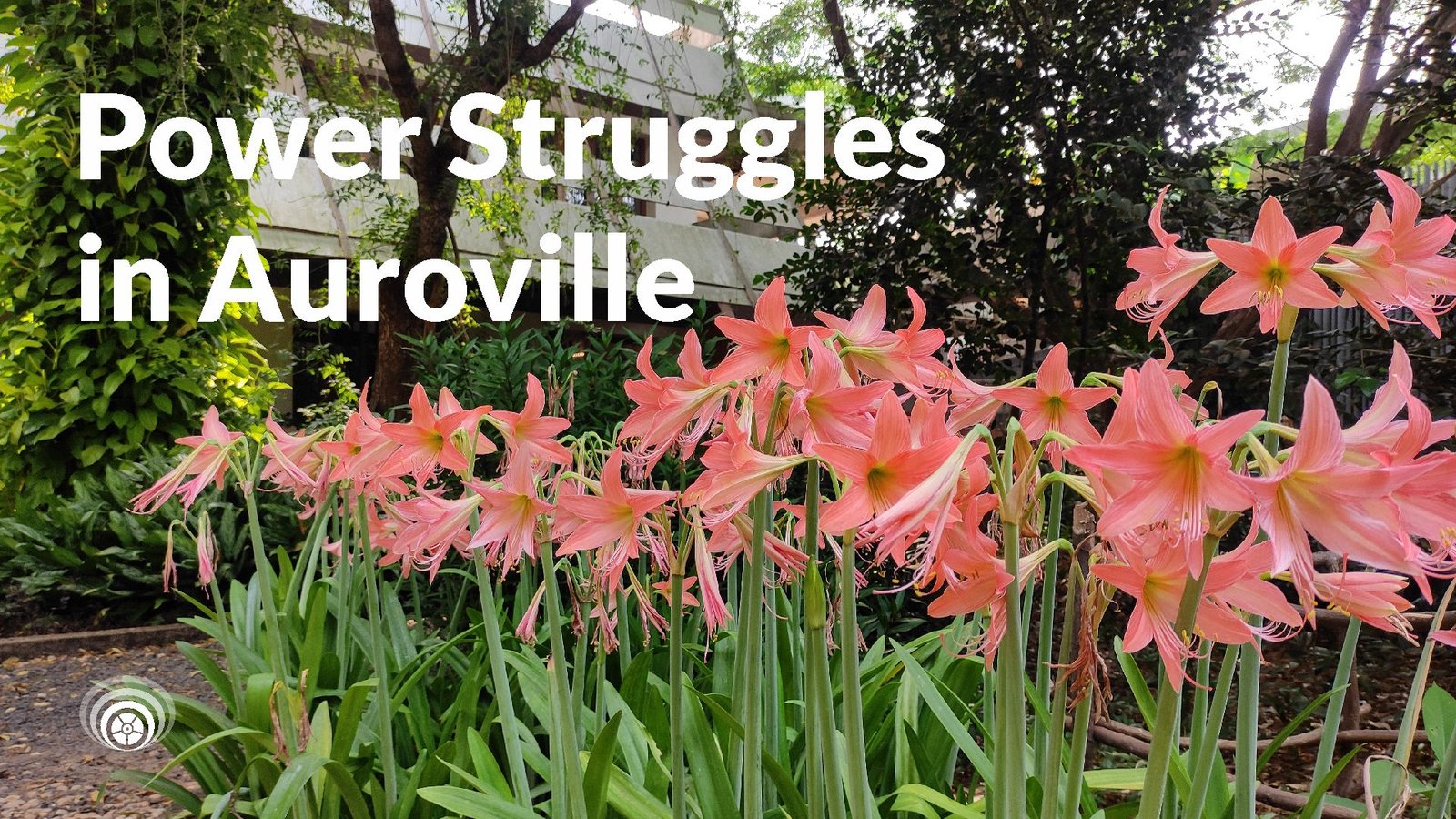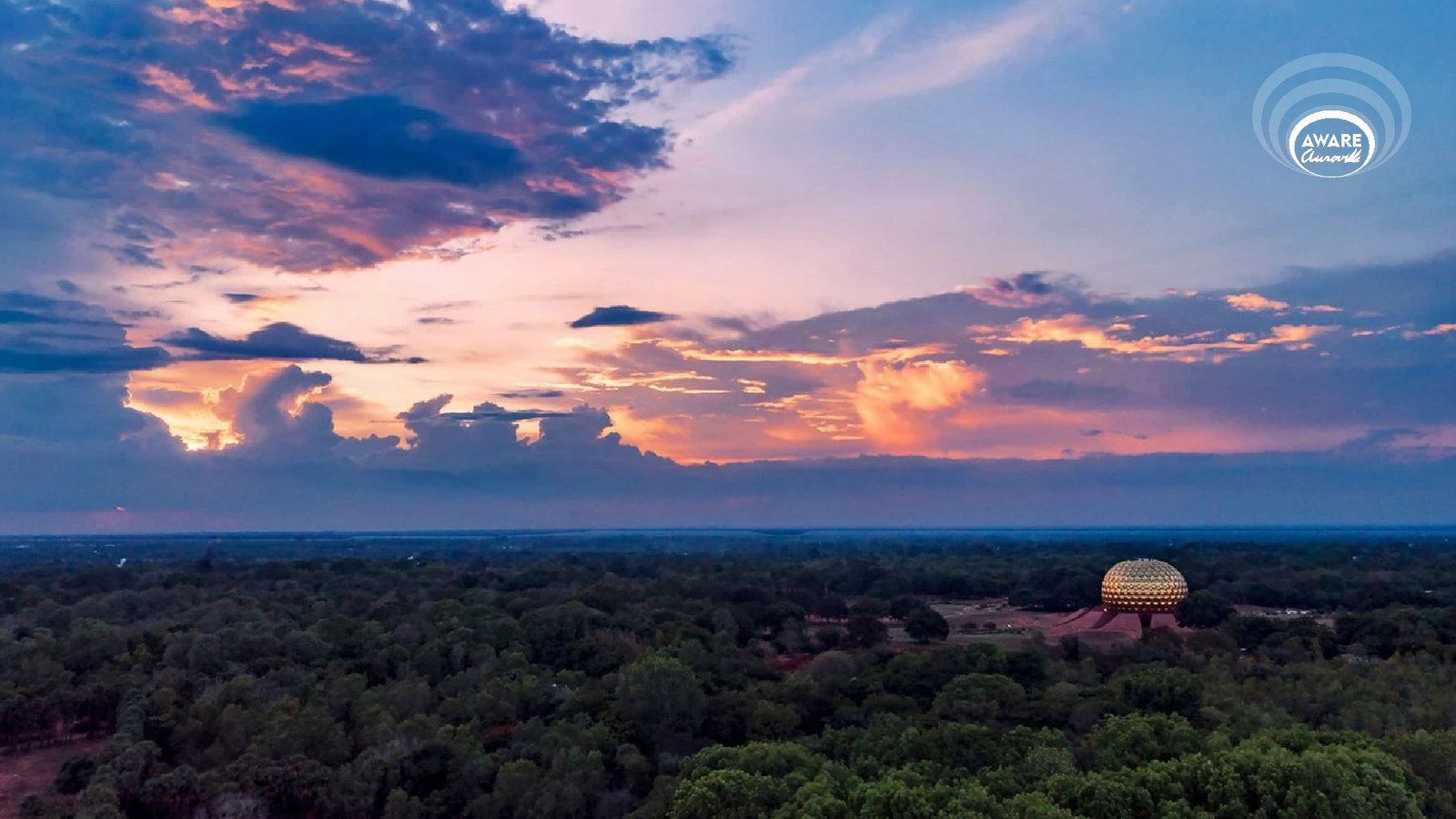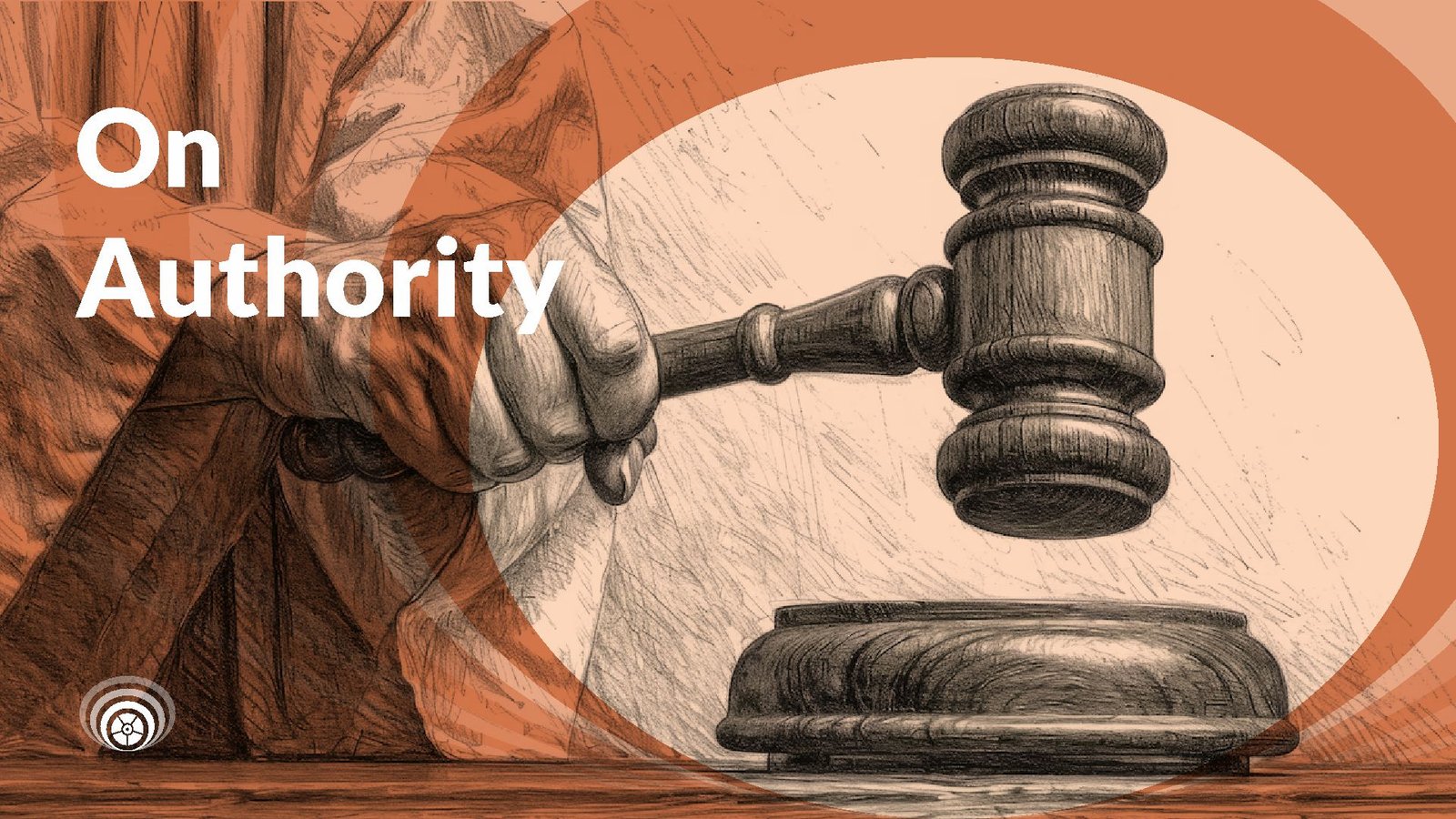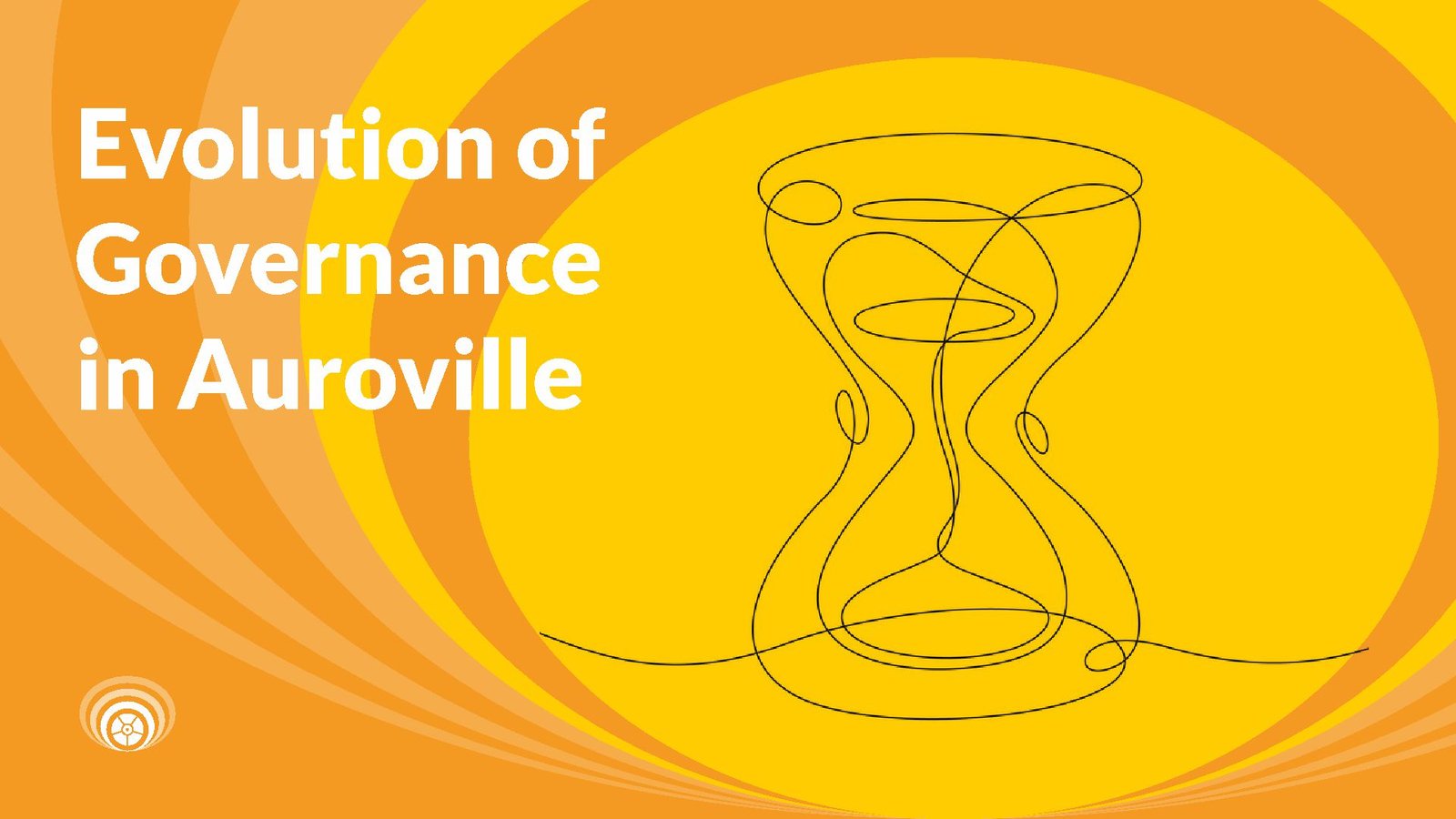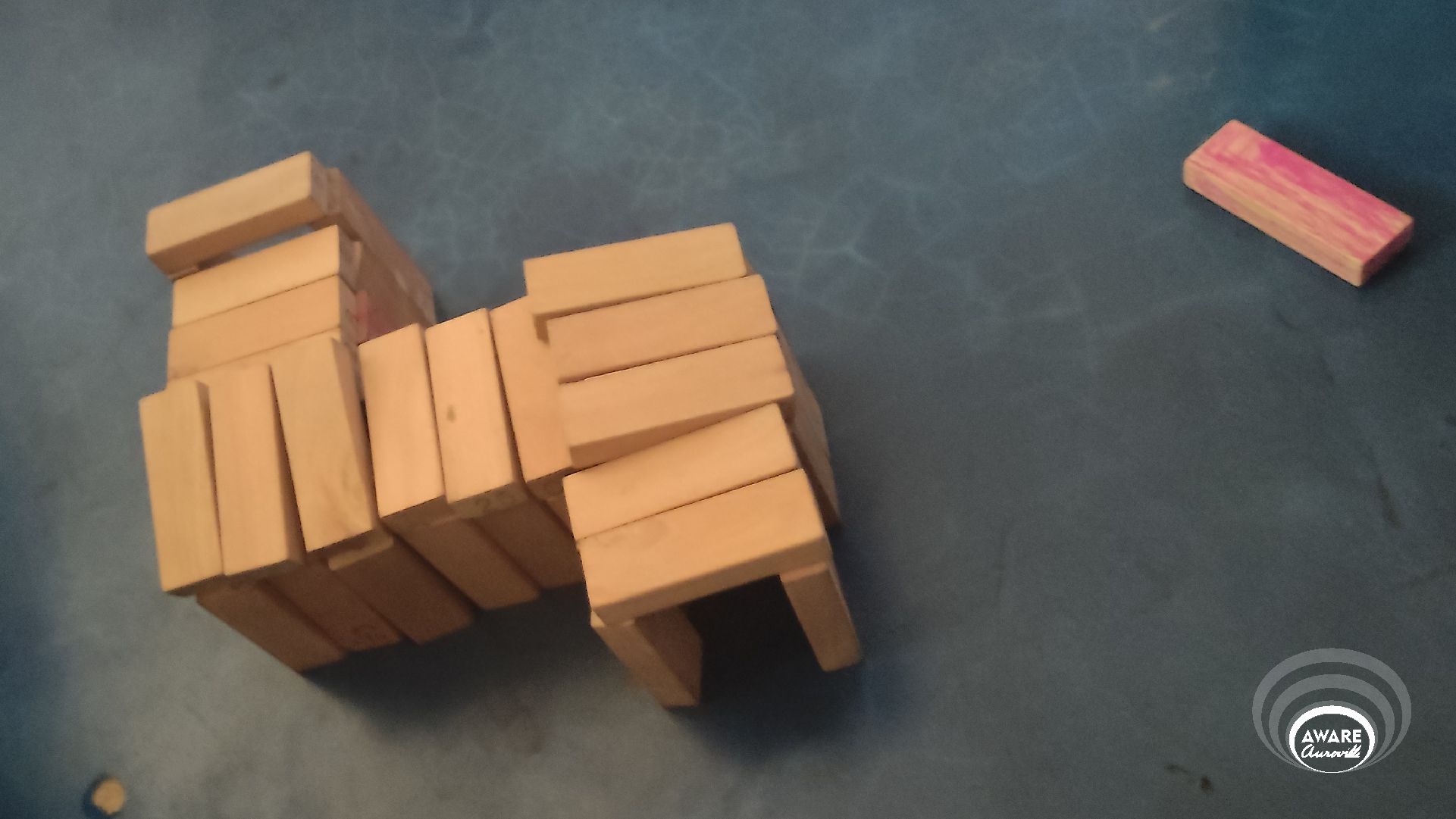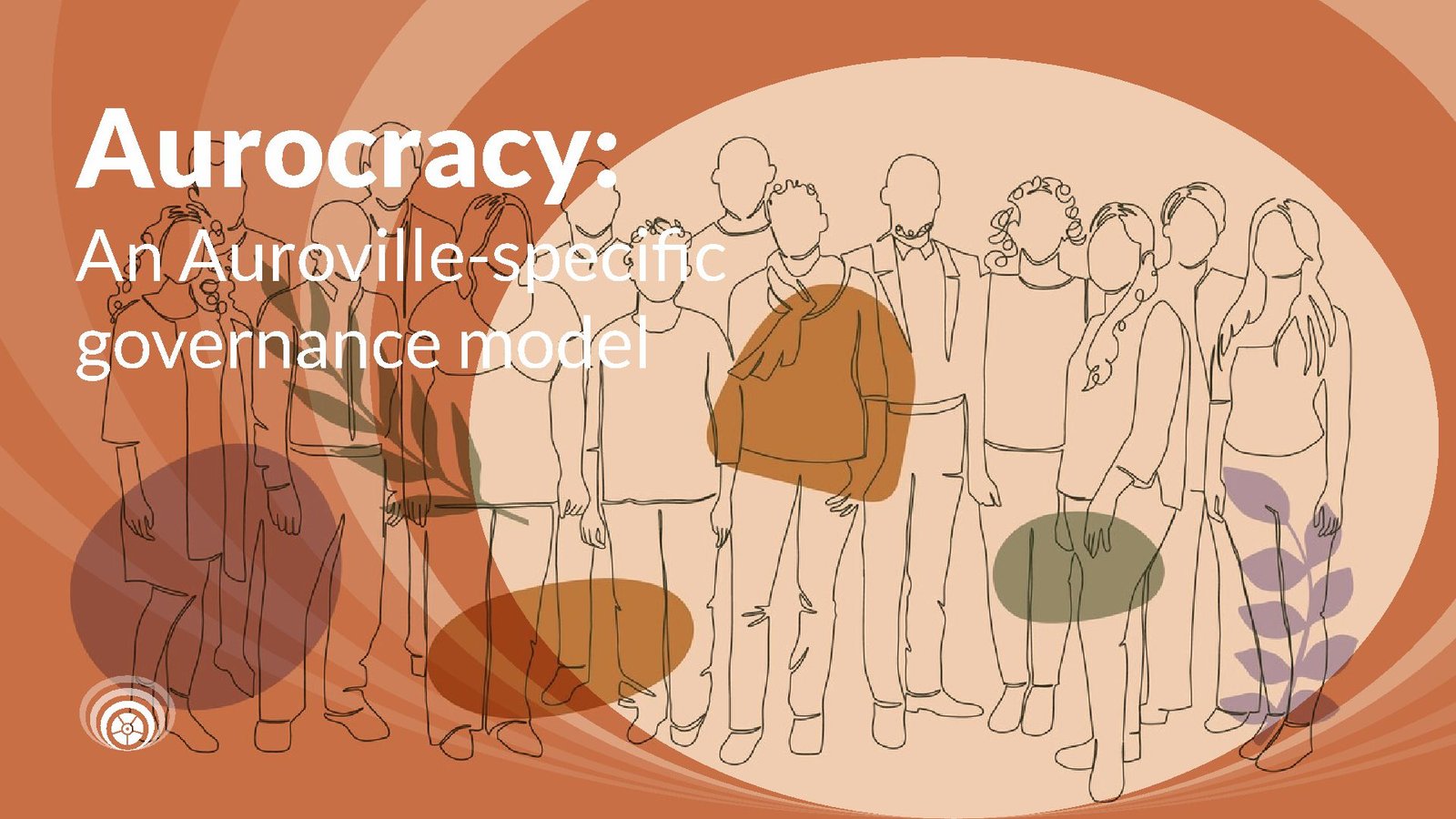Auroville faces a critical choice: continue internal power struggles or embrace collaboration. With the Government of India and courts reaffirming the Governing Board’s authority, resisting is futile. The era of influential foreign families’ control has ended, and hypocrisy must stop. Only Truth can manifest Auroville’s founding Vision of Human Unity and Progress.
Continue readingLanding Auroville
The need for land
The need for land to manifest Auroville is of paramount importance. Currently, Auroville is facing a critical moment in which external commercial development is encroaching upon its territory. Some residents have grown complacent, believing that the opportunity for consolidating Auroville lands has passed and that the manifestation of Auroville’s physical vision is no longer possible. This defeatist mentality has given rise to alternative ideas such as adopting a kibbutz-like lifestyle, repurposing lands for reforestation, and prioritizing personal comforts. If we can reignite the light of a physical possibility of Auroville, much of these malaise may disappear.
However, there are still a few individuals who remain committed to the original vision of Auroville. While they form a small minority, it would be naive to think that this group alone can achieve the consolidation of lands when the majority holds a different perspective. Therefore, the first task at hand is not only to consolidate the lands but, more importantly, to consolidate confidence and belief in the possibility of Auroville’s realization. If Aurovilians can rekindle the sense of possibility and overcome pessimistic thinking, much of the existing challenges can be overcome.
Presently, a pessimistic outlook prevails across the spectrum. Some radical individuals believe that preserving the existing green cover is crucial and prioritize maintaining the available lands. On the other hand, the progressive faction argues that the encroachments have already compromised the green belt, so the focus should shift towards building the City on the remaining 5 square kilometers.
In my opinion, both of these arguments are contrary to the spirit of Auroville. Losing sight of the City’s vision and creating a stark contrast between ghettos and luxurious lifestyles is not in alignment with Auroville’s principles. Similarly, forfeiting the much-needed green buffer and living at the cusp of the City that gives Time a break and the City that the Earth needs, would be a disservice to both Auroville’s aspirations and the region’s well-being. This approach would only lead to the emergence of yet another divided and branded community, akin to “White Town” and “Brown Town.” The food street of Auroville has reached till Certitude, soon it will merge with Dinesh and then it will be connected to the Crown. Auroville can boast of a contiguous and contagious Food Street from Solar Kitchen to Goodman. Or, it can be extended till GMT on promenade, perhaps making it the longest food street of the world.
Desirable for some. Disaster, for some.
Now is the time for collective action. Rather than competing with one another, let us channel our energy towards positive endeavors that contribute to the realization of Auroville. It is essential for the residents of the City of Dawn to recognize that the idea of the City cannot be buried any longer. Those who oppose the City or wish to shape it according to their personal preferences have two options: either continue to disrupt and hinder the City’s progress or disengage from any development and harbor resentment in their isolated spaces. Both these options are conducive to those who only aim at creating a concrete city with a bigger neighbourhood for market. The life in Auroville will become monopolised, monotoned and monolithicated. This is less interesting for those who believe in divergent methods, diverse modes, and divine means.
This piece aims to argue that not all hope is lost. It is indeed possible to consolidate the lands for Auroville and bring forth the physical manifestation of Auroville as it was originally intended to be.
The City Lands
The City Lands of Auroville encompass a 5 sq kms in the center of Galaxy, only about 50 acres remain to be acquired in multiple crucial pockets. From a financial standpoint, acquiring these lands is feasible. Auroville has over 10 crores in its Land Accounts and a collective fund of 130 crores. Additionally, there is the possibility of government assistance and fundraising efforts to support the acquisition. In essence, it is within the realm of possibility to obtain these lands.
However, the main obstacle lies in the willingness of the current landowners to sell. The remaining pockets are owned by affluent investors who, due to the urgency of Auroville’s need, are becoming increasingly driven by greed. If one were to consider the situation from their perspective, it is understandable that they may be hesitant to sell when they believe they can obtain even more money in the future.
In my humble opinion, the approach to acquiring these lands should not be solely based on financial incentives. It is essential to make these investors feel that they are contributing to a larger cause. Those individuals who possess the ability to persuade and convince them not to sell could potentially become the game-changers in this endeavor. By highlighting the significance and purpose of Auroville’s expansion, we can create a sense of shared responsibility and encourage these landowners to participate in the realization of Auroville’s vision.
The Green Lands
The acquisition of green lands for Auroville poses a challenge, particularly due to the rapid commercial development happening in the vicinity. The rate of fundraising is far lesser than the rate of inflation. People are buying left, right and center, given the premiumness of the address and proximity to a high potential tourist spot. Again, a sure shot investment. Hardly, any risk involved in investing in the Auroville Circle.
We cannot outbid our competition, given our current scale. Perhaps, the government would have invested in securing the lands, had we made our moves properly. But, we missed that bus too. Given all the negative media attention that we’ve garnered in the recent past, I’m sure that the government will not willingly invest money to buy trouble. In 2021, there was a high likelihood of securing the green belt through this means, but we’ve royally bungled it. Thanks to our high-horsed attention and approach.
In light of these circumstances, alternative options need to be explored. One possibility is pursuing policy-based protection for the green lands. This is an extremely low investment option, but may take some time for the lands to come into Auroville’s fold. Owing to the fact that Auroville is a Vision-based City, or a valuable tangible Heritage of India, or as an institution set up by an Act of Parliament, or as an environmental sanctuary, we can secure favourable conditions. However, things are murkier at this level. There are overlapping jurisdictions and ambiguity over control. Unfortunately, after securing the AFA88, we didn’t pursue further clarity. Auroville was set up as a project of SAS, with Mother as its President. We then continued as an undefined commune. Then we became a subject of the Central Government, under MHRD. However, land is an article of state subject. We never pursued the State Government of Tamilnadu seriously to get their official blessing. Though, partial attempts were made after the approval of the Master Plan by GB, in 2001.
1. The GoTN issued a Government Order(GO) in 2003 to the effect that all the development within the circle of Auroville can only be carried out with the permission of the Office of the Auroville Foundation. The efficacy of this order did not stand the test of time, thanks to the brevity of its content. It did not define who takes the final call, what if the panchayat decides differently, who gets the right of way then, the powers of the Auroville Foundation to enforce the GO, etc. If we look at the patterns of Auroville’s conflict management related to land, it seems, even we did not believe in this GO.
2. After the Master Plan was created, Auroville pursued the Directorate of Town and Country Planning (DTCP), under the Ministry of Housing, Tamilnadu, to get Auroville under the existing provision of New Town Development Authority (NTDA). This would have brought together the lands of 5 villages – which constitute the Galaxy Plan – to be assigned as a ‘New Town’ and gazetted officially. This would have meant that instead of a rural profile, we would have been considered as a Town Municipality with Auroville Town Development Authority, constituted in Town Hall, as a nodal body for all developments in our 5 villages. Given our Gazetted Master Plan, we could have easily secured the Green Belt by not allowing any untoward constructions. Unfortunately, we didn’t pursue it wholeheartedly, given the fear that NTDA would have mandated us to accommodate the local MLA and MP.
To be clear here, the NTDA in itself, would not have provided the lands to Auroville. However, given the clear mandate of the Master Plan, no investor / speculator would have bought the lands, which had the only option of being a green buffer for Auroville. We could have let the locals live in their lands, as long as they wanted or even tried to bring them into our fold. By all means, it would have negatively affected the speculative trends. We must all understand that the high prices of the land is not making the locals richer. It is the rich hoarders, greedy brokers and the outside middlemen who are profiting from the current situation.
The present ATDC seems to have given in writing to DTCP, withdrawing our 20-year old application. No arguments have been presented in favour of the withdrawal. At the same time, no alternative has also been suggested / undertaken.
If the ATDC believes that the likelihood of securing the remaining lands of Green Belt is a lost cause, then it is regressive, reductionist and regrettable. By securing a favourable policy decision by GoI or GoTN, we can still reverse the trend of encroachments within the Auroville Circle. This may also help us in securing the remaining lands in the City Area. The hoarders will queue up to get rid of their lands in Auroville, before it gets devalued further. Perhaps, the tables will turn, and we will be in a position to dictate the price, this time.
The Outlying Lands
The idea of exchanging the outlying lands of Auroville for the missing 1000 acres in the green belt may seem like a straightforward solution. However, there are valid reasons to consider alternative approaches rather than relying solely on this option.
Firstly, such an exchange would be a temporary and makeshift measure, serving as a stopgap solution rather than addressing the core issue of securing the lands of Auroville. It may provide a temporary fix, but it does not guarantee long-term sustainability or the preservation of Auroville’s intended vision.
Secondly, engaging in land exchanges at exorbitant barter rates can be financially burdensome and unsustainable for Auroville. It may lead to significant costs and place a strain on the community’s resources, potentially affecting other essential projects and initiatives.
Instead of solely relying on land exchanges, pursuing a route like inclusion in the New Town Development Authority (NTDA) or a similar approach could offer more comprehensive and lasting benefits. By securing a favorable policy decision from the Government of India or the Government of Tamil Nadu, Auroville could establish a solid legal framework for land protection and development within the designated area. This would provide stability and a stronger foundation for realizing Auroville’s vision.
Considering the long-term implications and the need for sustainable development, it is advisable to explore options beyond simply exchanging outlying lands. By prioritizing a comprehensive approach that aligns with Auroville’s principles and secures official recognition, the community can establish a more secure foundation for its future growth and development.
Moreover, we need the outflying lands to serve Auroville for purposes beyond Aurovilians. The allocation of the outlying lands for various purposes beyond Auroville can indeed serve to benefit both Aurovilians and the surrounding bioregion. Here is a breakdown of the proposed options for the outlying lands:
Education: 200 acres
Dedicate 200 acres for a separate educational institution outside Auroville for Higher, Wider, and Deeper Education. An institution with 2000-3000 learners and 500 mentors from around the world, can be housed outside Auroville. The bioregion will benefit with the rolling traffic and visiting guests. Still, not affecting life in Auroville. The young adults may choose to join Auroville after their education.
Agriculture: 200 acres
Reserve 200 acres for fulfilling the agricultural needs of future Auroville residents. This land can be utilized to cultivate crops, establish permaculture projects, or develop sustainable farming practices to support Auroville’s self-sufficiency goals.
Industry: 200 acres
Allocate 200 acres for Auroville’s units to engage in income-generating industrial activities. This can include labor-intensive industries that benefit from being located outside Auroville, minimizing their impact on the community’s daily life while contributing to its economic sustainability.
Accomodation for Volunteers & Staff: 200 acres
By default, we must nudge the Aurovilians to move inside the circle of Auroville. However, we can maintain a housing infrastructure for 10000pax in the lands next to Auroville, dedicated to volunteers and the staff who work in Auroville.
Guest House: 100 acres
The exotic locations next to the beach, forests, canyons, markets, highways, etc. can be turned into Guest Houses and large Hotels of various budgets, from dormitories to presidential suites. We need to create 10000-bedded accommodations of different types.
2 Visitors Center with parking: 100 acres
We must create a large 50 acre Visitors Centre each on ECR and by-pass road. This will address the needs of the demanding tourists. We can house all our popular eateries and shops at these two locations. This way, we can free up the existing Visitors’ centre and turn it into an Information Centre. We may ply electric buses, pods, taxis from the outside VC to the information centre. The visitors should not be made to transact monetarily within the Auroville Circle to reinforce the idea of no money in Auroville. Provided we generate ample income from 2 VC outside Auroville, we can provide for the basic needs of the Guests, free of cost.
Bioregion Development: 100 acres
I know, I’ve exceeded 1000 acres. But we actually have more. The remaining 100 acres are alloted to the activities dedicated to the upkeep and upliftment of the nearby villages. The outreach schools, AVAG, Kuilai centre, etc. can all be accounted for here.
In conclusion, securing land for Auroville is crucial for its manifestation and potential. Challenges can be overcome through strategic planning, collaboration, and belief in Auroville’s possibilities. The City Lands require confidence-building and resource mobilization. The Green Lands demand policy-based protection and favorable conditions to preserve the green belt. Outlying Lands offer opportunities for education, agriculture, industry, residential infrastructure, guest houses, visitors centers, and bioregional development. Landing Auroville demands stakeholder engagement, collaborations, policy-based protections, and efficient resource utilization. By embracing unity, and cooperation Auroville can navigate challenges and grow as a remarkable experiment in human unity and sustainable living.
If not for Auroville, then why are we here? If not the way Mother dreamt, then how? If not the City the Earth needs, then what?
If not us, then who? If not now, then when? If not here, then where?
On Authority
Authority in Auroville lies in the Charter, the Divine Life, and as a first layer of execution means Leadership: the 3 bodies of governance called The Foundation, and it consists of Governing Board, Residents Assembly and the International Advisory Council.
Continue readingEvolution of Governance in Auroville
The evolution of governance in Auroville has witnessed the exploration and experimentation of various models over time. While Auroville’s governance structure has not followed a linear progression through these models, different elements and aspects of each model have been explored and adapted based on the community’s needs and values.
Continue readingThe Responsibility & Privilege of Building Auroville
For the last 23 years I have been visiting Auroville regularly. I have also presented the city of Auroville through the Lur Gozoa Association, especially two exhibitions of the city, the model of the Galaxy and its Master Plan. At the end of this letter, I expose my curriculum for your more detailed information. I have spent a few weeks in Auroville, on such important dates as Mother’s Anniversary and the 55th Anniversary of the City of Auroville, I have shared and held conversations with all kinds of Aurovilians, old residents, some of the pioneers, new Aurovilians, visitors… people of different nationalities. All these people seemed to have no other type of conversation than to give their opinion on the subject of the Galaxy and more specifically on the Crown.
I believe that the moment we are living is extremely delicate in the sense that the project of Sri Aurobindo and Mother is about to manifest itself in a progressively active way, finally after 55 years in which it has been slowing down for various reasons. The reasons for which the project has been stopped and slowed down for so many years are not relevant and it is not appropriate to count them and even less to personalize or name the different ways of manifesting the “fear” of realizing such a great work, not because of its size, but because of its significance.
The work, the project of manifesting the City that the World Needs, the City that will welcome the Humanity of the Future, to participate in it, in this laboratory, is very scary, it is an enormous responsibility, because it is not a matter of manifesting and building houses, roads, social premises, dining rooms, commercial places… etc., which also, of course, is a matter of course. The difficulties of building are solved immediately, mostly with money, with financing.
The problem comes, the fear of responsibility arrives when the construction of a project of colossal magnitude, born from the dream of some exceptional beings, is in hand. Those same exceptional beings, by Their Grace, have called in some subtle way all the people who are now living in what will be the City of Auroville. It is understandable that during all these years it has been difficult to prioritize the construction of the City taking into account the difficulties of financing. Finally the Matrimandir has been built, the soul of the City, its gardens, the lake (for so many years it was believed to be an “impossible dream” and thanks to new technologies it has been possible to build, nothing is impossible if someone already dreamed it, and in that case the Dreamers were, are exceptional), the different aids and donations have had to be distributed and prioritize the most immediate and necessary. It is understandable, even occupying land with the most immediate to continue to keep the spaces alive while building, but without losing sight of the ultimate goal: why and for what reason we are in Auroville, why I answered the call.
With new technologies it will be possible to do things now and in the near future, innovations that seemed impossible when Mother dreamed them up. It is clear that Auroville is not going to be the place from which new technologies are born for the rest of the world, but it will be the place where those technologies are used in unexpected and innovative ways. What is certain is that the very experience of living in Auroville, of overcoming the difficulties, of attending to the detachments to our way of living, the flexibility in changing our minds, our ideas, overcoming the need to want to reduce with our little minds with their egoic needs the projections of Beings who have come to push our evolution, is what will make Auroville different from any other human enterprise undertaken so far. This is the wonderful contagion. Reaching 50,000 people living in Auroville with those who one day managed to reach this goal, is what will give the critical mass necessary to replicate it in other places in the world. This is what the Auroville laboratory is based on.
Auroville is for the world, it is not for a few privileged people. The privilege is to live to build Auroville, to have heard the whisper of the Masters and to accept it.
At this time, on the occasion of the 150th anniversary of Sri Aurobindo’s birth, the eyes of India have turned to Auroville and have begun to recognize the figure of the Master in a strong way. Sri Aurobindo’s 5 Dreams resonate strongly and this seems to have activated the need to strongly support the building of the city, another of Sri Aurobindo’s dreams. “There should be somewhere in the world…”. Mother knew that no other nation could participate in the experiment, allow it. And 55 years later, India goes a step further and commits to fully fund the construction. And it begins to do so…
It is time to protect the Dream of Sri Aurobindo and The Mother, supporting the construction, being as close as possible, contributing what we have learned. It is time to build and protect, being grateful. It is not time for unsustainable absurd confrontations that confuse, that generate pain and allow fear to have its way. The people who live in Auroville have to remember their Dream. The people of Auroville have to remember that they have gone to India, to Auroville, to become Aurovilians and that being Aurovilians does not consist only in living in Auroville, but in getting involved in building the city of Human Unity and overcoming all the difficulties, material, emotional and spiritual that this challenge demands. Remember the words of Mother: “To be a true Aurovilian …………” the 7 points that She lists and that I, although I do not live in Auroville I consider them as a reference for my daily Sadhana, how to be a true human being. ALL LIFE IS YOGA.
In Auroville there is no need to build bridges of understanding. Whoever calls himself a mediator is fulfilling a task that no one has asked of him and is not necessary. Only an exquisite equanimity can attend to the needs and approaches of all the parties involved and, in this sense, as far as I am concerned AVI Spain is not fulfilling the function of representing all the sensitivities that are taking place at this time and with its clumsiness (which I do not doubt has good intentions) is aggravating an issue that the good will of all the people involved will know how to solve with intelligence and heart.
I request, by means of this letter, that AVI Spain, in this case, cease with the particular personal opinions of its president. I do not believe that AVI Spain is being able to transmit in an equanimous, fair and serious way to the people it represents, the reality of the delicate and decisive moment that the Auroville community is living and that with its visceral appreciations it is being of little or no help, furthermore it is producing unnecessary confrontations.
I can provide documents addressed to AVI Spain that last year I already sent through the Lur Gozoa Association, if required. I understand that the way in which AVI Spain, in the figure of its president, continues to address and present the issue is inappropriate and seriously affects the honor of some people living in Auroville giving names and whatsapps, thus subtracting them ability to resolve personally in a serene way any injury that may arise due to the different ways of understanding and evolve with respect to the construction of the city according to the Master Plan, accepted and sealed by The Mother.
The impartiality in “telling” the story of the process that the Auroville Community is going through must be exquisite, in the case that the different AVI’s have decided that they must participate and transmit the evolution of this important and decisive moment. I understand that we must, all the people involved in different ways, transmit calm, serenity and support and above all confidence that the people will be able to solve it with the sure help of The Mother, who is taking care of them and of the City that the World Needs, the City of Human Unity.
A twinned embrace in Her Light.
Aurocracy: An Auroville-specific governance model
Over the period, Auroville has developed a unique governance model, which can be called Aurocracy, which is based on the principles of collaboration, self-governance, and self-awareness. In this article, we will explore the Auroville specific governance model – Aurocracy. The Aurocracy governance model is based on the principles and purpose of Auroville as outlined in the Charter. It is a unique model of governance that seeks to promote harmony, unity, and progress among the residents of Auroville.
Continue reading
